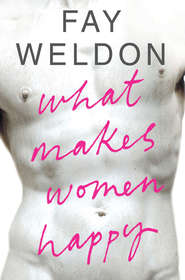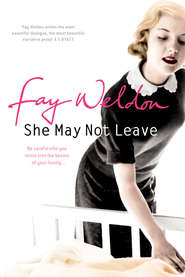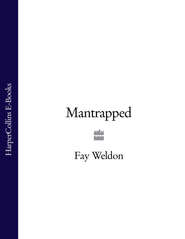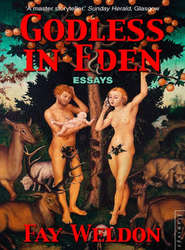По всем вопросам обращайтесь на: info@litportal.ru
(©) 2003-2024.
✖
The President’s Child
Автор
Год написания книги
2018
Настройки чтения
Размер шрифта
Высота строк
Поля
‘She’s wicked!’ said Jennifer. ‘Wicked!’
‘She’s mad,’ was all Hope would say. ‘She’ll be better when the baby’s born. How could anyone look like that – tight to bursting – and not be slightly mad? Let’s hope it’s temporary.’
And Hope waved her scarlet, perfect fingernails in the vague direction of Hilary, who refused to wear the kind of full and blousing garment which would hide her extraordinary shape – she seemed to be without fat, and the baby lay inside her, with its folded form straining and outlined just beneath, it seemed, the skin of her belly.
When the baby was born, plopping easily into the world, it was, indeed, discovered to be a boy, and Hilary loved him very much, and little Lucy spent her time attending to its infant male needs; and Hilary’s friends were indeed scornful of its maleness; and Hilary’s lovers complained of the attention she paid it in the night; so Hilary renounced her lesbianism altogether, and thereafter had to put up with Jennifer’s rather patronising forgiveness, and the told-you-so attitude of Wincaster Row.
The new baby’s father, even, cautiously, came back from time to time to dandle it upon his knee. He took Lucy out as well.
‘I’m not one of your sissy men,’ he’d say. ‘I’m not one of those poncy men who dance attendance upon feminists and get their kicks out of being mentally whipped, and run the crèches at women’s conferences in return for a kick and a smile. I’m just sorry for the poor little bugger.’
Hilary would dance up and down with rage. She was a beautiful girl, in a brownish, sinewy kind of way, and tried to live by her principles. Even Jennifer acknowledged it.
‘The world is so arranged,’ said Jennifer, surprisingly, ‘as to make doing right almost impossible. At least Hilary is trying.’
Jennifer gives Hilary little dresses and little white socks for Lucy, but Hilary just puts them in the jumble sale, and Lucy goes on wearing dungarees. Lucy longs for dresses and dolls, but perhaps that is only because she isn’t allowed them.
I had a baby once: it was neither male nor female. It was born without reproductive organs: it died within five minutes of birth and just as well. Extraordinary things are born to woman: mutants of another race, unviable. Cling to a sense of self through that, if you can. Of purpose. I asked the doctor not to tell Laurence what the matter with the baby was. (Can we call this thing, my child, a baby?) How could I say to Laurence, you and I together, this is what we made. Nothing. We cancelled each other out. I bore the burden of this knowledge alone. Stillborn, I said, and Laurence didn’t ask any further: barely a why or a wherefore, and he an investigative journalist, and, as usual, away at the time.
Easier to find out and condemn what goes on in another country, in a far-off place, than what happens in your own home and in your own heart.
I told Isabel. ‘Aren’t you angry?’ she asked. ‘I would be, if fate picked me out amongst millions, and dealt me a blow like that.’
I replied that I had worn anger out. But it may not be so. Perhaps after all it was red rage that burned out my eyes. Or perhaps it was only fate, being kind, dealing me a trump card. Certainly I have caught Laurence’s butterfly nature on the pin of my helplessness; he struggled a little and made his protest, drunk and unshaven down at the pub, and now lies still, and holds me in his arms, careful and caring and good at last, frightened to move suddenly unless something else gets torn.
You really cannot expect a blind woman to have a baby. Some do, of course, but it isn’t expected. Soon I will be too old, in any case, and saved.
Buzz-buzz! How busy we all are along Wincaster Row. At least the bees stop at night, when cold slows their wings and the weight of the honey they won’t let fall all but defeats them. They make it back to the hive if they can, and die if they can’t, uncomplaining and dutiful. A bee could spend its days, as a butterfly does, glorifying its maker, dancing in the sun, rejoicing in the Lord – but no, it prefers to labour. Nevertheless, the bees are clearly pleased by the fuchsia hedge.
Work in Wincaster Row does not stop when night falls. Then the fuchsia bush hangs darkly and silently at the end of the garden. I remember it from my sighted days: how the lights from the windows – which sometimes burned all night – would outline its shape: it seemed then a hovering storm cloud, picked out with flecks of blood.
Oliver the architect sometimes works until two or three in the morning. He is designing a building for the disabled: he works for nothing. Anna, his wife, would prefer that he should work for something and spend more time with her and the children: but seldom says so.
‘For heaven’s sake,’ Hope says crossly, ‘if only everyone would look after themselves and forget about the rest of the world, it would be in a much better state.’
Hope’s lovers bring her chocolates and flowers, in the hope of making her feel something more than kindness towards them. They puzzle her. What is it they want? Sex she understands, and offers, but they want her essence, her very soul, not just her body. She is writing a paper on Thucydides. No one will pay her for it, she explains. It will be published in an obscure magazine and forgotten. But it’s interesting: such things must be written. Hope lectures in Greek poetry at Birkbeck College, to mature students. They study for the sake of it, not in the hope of future employment. One pupil is over eighty.
Buzz-buzz! Dawn’s breaking. I can tell, because I hear the bees.
Hope once got stuck halfway up the oak tree in the communal garden. She was trying to rescue a kitten. Hope wept: the kitten wailed: the fire engine arrived. Ivor the alcoholic fell hopelessly in love with Hope, for at least a month, and Ivor’s wife baked bread furiously, in the hope that her proper domestic worth and value would become apparent to him—which indeed it always was, but what has love to do with just deserts? Those who don’t deserve it, receive it. Those who most need it, seldom have it. To those who hath, as Jesus once observed, to the shock and dismay of all around, shall be given, and to those who hath not, even that small portion that they hath shall be taken away.
It was Hope who let the men who called themselves electricians in to No. 3. They turned up at six one morning in a London Electricity Board van, when Homer, Isabel and Jason were off visiting friends in Wales, and spent an hour inside the house, seeing, they said, to faulty wiring.
Hope was out early trying to find a kitten she thought she heard crying. Buzz-buzz! She shinned up a drainpipe for the LEB men, climbed over on to the balcony, and in through the window and down to the hall, through the coats and the bicycles and by the grandfather clock, and opened the front door for them, before you could, as it were, say Jack Robinson.
‘Thank you, miss,’ they said, admiring. She had lovely legs, which showed to advantage as she leapt gazelle-like from point to point on the face of the building. Hope always let everyone in, up and down the row, if they’d forgotten or lost their keys.
‘Think nothing of it,’ she said.
No doubt they could have let themselves in more simply, had she not happened to be out of bed early, looking for a lost kitten.
After the electricians had been and gone, listeners could hear everything that went on in No. 3, if and when they wanted. The IFPC had their listening devices installed. Buzz-buzz!
5 (#ulink_06749eb3-5b8e-546d-a6f2-7b447ab1f800)
Homer, for a day or so, said no more about Jason needing to see a child therapist. Isabel went nervously about her work and life, watching Jason for signs of inner disturbance. Any child, when watched closely, when faith has gone, can appear both deranged and malicious. Naivety can seem calculated, charm self-conscious, the noisy and instant expression of emotion a covert attack upon the adult. Isabel knew this, and reassured herself. Jason was a six-year-old child behaving like a six-year-old child, and was neither her persecutor nor her victim.
Which was just as well, because if Jason was indeed suffering some inner turmoil, which only truth would resolve, then she would have to start digging away at the very foundation of her life with Homer, and this she did not wish to do. Self-interest, as well as maternal pride, was at stake. Jason, for everyone’s sake, had to be in good heart and good health.
Dandy Ivel made a speech about probity, integrity, endurance and fidelity. It was reported on British television. Isabel changed programmes. Homer said, ‘That man throws abstract words about like karate chops, the better to confuse and terrify.’ Isabel said, ‘Yes, doesn’t he?’
Isabel and Homer and Jason went to stay for the weekend with the Humbles, in Wales. Ian and Doreen had given up their Wardour Street life of (him) dress-designing and (her) film-making, and taken to sheep-farming up a distant Welsh hillside. Ian and Doreen drove a battered Land Rover stuck with anti-nuclear stickers, and their children were dressed in stiff woollen garments, hand spun, natural dyed, and knitted on very thick needles; their tiny limbs, thus encased, and macrobiotically lean, found movement difficult. They sat on the splintery wooden floor of their homestead and wailed. Jason took offence at this, and no amount of reproof or explanation could prevent him from setting about them with his fists.
‘Jason, they’re only little. Please stop.’
‘Jason, it’s their home, their toys. They don’t understand about sharing. They don’t go to school, as you do!’
Doreen taught the children at home, as she was qualified to do. She didn’t want them subjected to the brutality and corruptness of (presumably) the likes of Jason.
‘Jason, if you go on like that, you’ll have to go to bed.’
Jason was frightened by the dark and the silence and became hysterical when Isabel tried to put him to bed, wrapping tentacle-like limbs around hers. Presently, when he was calmer, Homer took him away and bathed him, in a tin bath in the outhouse filled by hand from a tank inadequately warmed by a solar panel. But Jason found the presence of a broody hen offensive and frightening (according to Homer, later) and then bit his father in his struggle not to be bathed, and then denied that he had, although the marks were clear enough on Homer’s ankle.
‘He doesn’t travel well, that’s all,’ said Isabel, lightly, and pointed out that Ian and Doreen’s girls twitched and scowled and whined; and that although they didn’t make nearly so much noise as Jason, they were equally troublesome, and had stolen his silver tractor and hidden it, quite deliberately.
‘But they didn’t bite,’ said Homer. His horror of biting was irrational, he agreed. A child might well feel it reasonable to use his teeth to make an impression, in every sense of the word: nevertheless, Homer was upset by it.
The night they returned to London Jason wet the bed. Homer stripped the sheets and washed and turned the mattress.
‘Isabel, you must see,’ he said. ‘Jason is upset and worried and needs help. What are you worried by? What are you so guilty about? I don’t understand it. It’s so unlike you.’
‘I don’t want him defined as disturbed,’ she said. ‘I don’t want him given pills.’
‘Neither of those things will happen,’ said Homer. ‘Perhaps you’re afraid of some criticism of you? That it might be said that Jason’s troubles stem from your work? But we both know that isn’t so: my working is as likely to upset Jason as your working. We’ve both been equally involved in his upbringing – except I notice it’s me dealing with the sheets when he wets the bed!’
Isabel capitulated. Homer brought Dr Gregory to her attention.
‘Who recommended him?’
‘Colin Matthews.’ Colin Matthews was one of Homer’s authors. He wrote bestselling political novels.
‘But you don’t trust his judgement or his politics or his style. How can you trust him to be right about a child psychologist?’
‘Dr Gregory saw his daughter through a bout of head-banging. Little Antonia. Do you remember? We went to her christening party.’
‘We shouldn’t have gone. It was hypocrisy. The whole child’s life is based upon hypocrisy. The father’s a fascist and the mother a hyena, and Antonia goes to a Steiner school. No wonder she banged her head.’
Isabel knew she was being unreasonable and ridiculous. She could feel her bottom lip, already so thinned and mutilated, tightening and narrowing yet more, to become, in the end, her mother’s.











